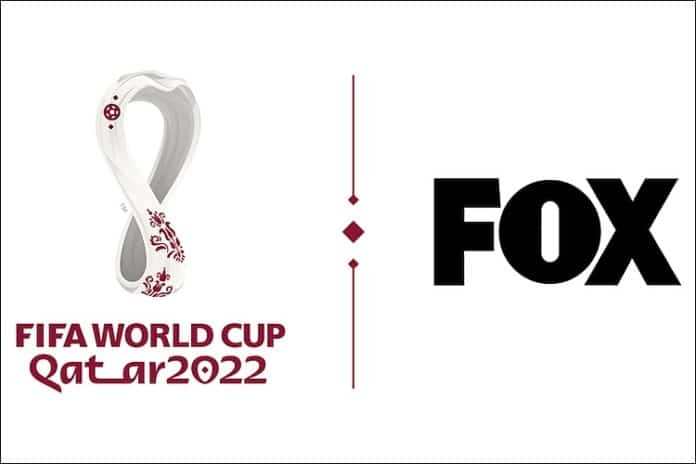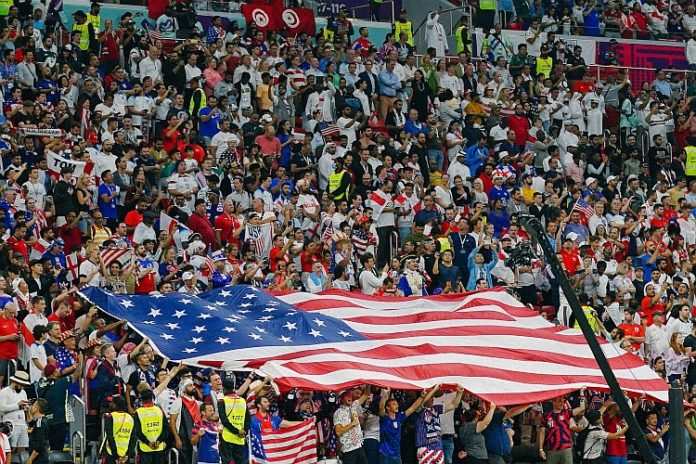★ The Sports Examiner: Chronicling the key competitive, economic and political forces shaping elite sport and the Olympic Movement.★
★ Want TheSportsExaminer.com insights for your team? Yes! Click here for info on speaking, research and consulting from editor Rich Perelman. ★
★ To get The Sports Examiner by e-mail: sign up here! ★
≡ THE 5-RING CIRCUS ≡
1. U.S.-Wales match draws 11.9 million-plus viewers in U.S.!
2. Paris 2024 budget expected to expand to €4.4 billion
3. Canadian Olympic and Paralympic groups ask B.C. reconsideration
4. Denmark Football Union angry, but not leaving FIFA yet
5. Kenyans and Ethiopians comprised 80% of AIU road-race tests
The first U.S. television viewing reports are coming in the 2022 FIFA World Cup in Qatar and despite the early start times, Americans are tuning in quite strongly. Nearly 12 million watched some or all of the U.S. vs. Wales game last Monday, either on FOX in English or in Spanish on Telemundo. The Paris 2024 organizers expect to have a final budget approved of €4.4 billion, up about 10% from the December 2021 estimate, but are confident that it will be covered by better-than-estimated ticket sales and some more domestic sponsorships. The Canadian Olympic Committee and Canadian Paralympic Committee both asked the Province of British Columbia to reconsider its refusal to support the Vancouver bid for the 2030 Olympic Winter Games, but has not gotten any positive response so far. At the FIFA World Cup, Denmark’s football federation continues to criticize FIFA for not allowing the “OneLove” armband to be worn and wants to discuss future actions, even up to leaving FIFA. The Athletics Integrity Unit published a report on its new road-running testing initiative, which in 2021 tested 803 runners from 70 countries. Special attention was given to 313 top-level runners, of which 80% were from Kenya or Ethiopia.
1.
U.S.-Wales match draws 11.9 million-plus viewers in U.S.!
Although comprehensive data for U.S. World Cup viewership won’t be available until next week, information on Monday’s games was released on Wednesday with strong interest in the U.S. team playing in Qatar. The numbers (with dates and Eastern start times):
● 20 Nov. (Sun: 1058a): 3.071 million for Ecuador-Qatar on FS1
● 21 Nov. (Mon: 0742a): 1.388 million for England-Iran on FS1
● 21 Nov. (Mon: 1043a): 2.581 million for Netherlands-Senegal on FOX
● 21 Nov. (Mon: 0143p): 7.761 million for U.S.-Wales on FOX
That’s pretty good for early morning or afternoon air times, especially on Monday, and these figures do not include ratings for Spanish-language Telemundo, which also grabbed a lot of attention:
● 20 Nov. (Sun.): 4.1 million total audience for Ecuador-Qatar
● 21 Nov. (Mon.): 1.2 million total audience for England-Iran
● 21 Nov. (Mon.): 1.9 million total audience for Netherlands-Senegal
● 21 Nov. (Mon.): 3.4 million total audience for U.S.-Wales
So, for the U.S. and Wales, the combined FOX and Telemundo audience was more than 11.861 million viewers, not counting English-language steaming views. For comparison, the Monday Night Football match shown at 8 p.m. Eastern between Arizona and San Francisco drew 11.166 million viewers on ESPN. Not bad at all.
The “World Cup Tonight” show on FS1, shown daily at midnight Eastern time, drew just 75,000 viewers on Monday (21st), but 277,000 on Tuesday (22nd).
2.
Paris 2024 budget expected to expand to €4.4 billion
Inflation, supply chain issues and the inevitable unforeseen costs will require the Paris 2024 Olympic organizing committee to formally increase its budget from the current €3.9 billion (about $4.06 billion U.S. today) to €4.4 billion (~$4.58 billion) when its Board meets on 12 December.
Speaking after a meeting of the Paris 2024 Executive Committee, finance chief Fabrice Lacroix said that half of the increase is from inflation pressures and the remainder from increased (or unplanned for) costs in energy, cybersecurity, the opening ceremony to take place on the River Seine, personnel expenses and other items.
The good news is that the organizers expect to hit their €1.1 billion domestic sponsorship target (and maybe a little more) and that the €1.365 billion target for ticket and hospitality package sales will likely be exceeded. But it is anticipated that 2023 will bring expenses that will begin to draw on the €315 million in contingency reserves.
The organizing committee budget was projected at €3.8 billion in 2020, which rose to €3.9 billion at the end of 2021, and now what is expected to be the final figure of €4.4 billion. The Paris bid in 2016 projected organizing committee costs of €3.37 billion.
3.
Canadian Olympic and Paralympic groups ask B.C. reconsideration
As the 2030 Olympic Winter Games bid cycle moves along without them, the Canadian Olympic Committee and Canadian Paralympic Committee issued an open letter, asking for the Province of British Columbia to reconsider its decision not to support the project.
COC President Tricia Smith, also a member of the International Olympic Committee, told the Canadian Broadcasting Corporation:
● “We’re really hopeful that we can meet with all levels of government and the stakeholders to really have a full discussion about the bid, the pros and cons, who might take on what.”
● “If it doesn’t make sense then it doesn’t make sense, but we haven’t had that opportunity with everybody at the table to really have a hard look at this and see what we can do.”
● “And the federal government has advised us, the prime minister has advised, the province has to be on board first. They would come to the table if the province came to the table.”
● “We know that these Games would also address some commitments made by the federal government in terms of the United Nations Declaration on the Rights of Indigenous People. So it’s really action on reconciliation.”
However, Lisa Beare, the British Columbia Minister for Tourism, Sport and Culture, told the network on Tuesday that the door is essentially closed:
“The 2030 Olympic bid proposal includes billions of dollars in direct costs and potential guarantee and indemnity liability risks that could jeopardize the province’s ability to provide services for British Columbians.
“The province has the responsibility to weigh the benefits with the costs and possible risks of the project, and based on careful consideration, the province declined to support a bid.”
Smith and Canadian Paralympic Committee head Marc-André Fabien are hoping that new British Columbia Premier David Eby can be persuaded to look at the project again, but he has so far declined to show any interest. The bid budget asked for C$1.2 billion (~$749.2 million U.S.) in provincial support.
4.
Denmark Football Union angry, but not leaving FIFA yet
The Chair of the Danish Football Union, Jesper Moller, told a news conference on Wednesday that his federation has discussed leaving FIFA, along with others: and that discussions with other Scandinavian federations
“We have been clear about this for a long time. We have been discussing it in the Nordic region since August. I’ve thought it again. I imagine that there may be challenges if Denmark leaves on its own. But let us see if we cannot have a dialogue on things.
“I have to think about the question of how to restore confidence in FIFA. We must evaluate what has happened, and then we must create a strategy, also with our Nordic colleagues.”
Moller said that his federation would not support FIFA President Gianni Infantino (SUI) for re-election, in which he is running unopposed.:
“There are presidential elections in FIFA. There are 211 countries in FIFA and I understand that the current president has statements of support from 207 countries. Denmark is not among those countries. And we’re not going to be either.”
Denmark has been one of the most strident critics of the selection of Qatar as the site of the 2022 FIFA World Cup, and of FIFA’s decision not to allow the captains of seven European countries to wear a rainbow-themed “OneLove” armband at the World Cup.
Danish federation communications head Jakob Hoejer told Reuters that no action is imminent:
“Some media have made the misunderstanding that DBU will withdraw from FIFA.
“That was not said at the press conference. We’re critical and not satisfied and we’ll not vote for the present FIFA-president. We will discuss further actions with our Nordic and European colleagues.”
5.
Kenyans and Ethiopians comprised 80% of AIU road-race tests
The Athletics Integrity Unit published a detailed report on its road-racing testing activities for 2020 and 2021, showing a heavy concentration on Kenyan and Ethiopian athletes, but still testing competitors for 70 nations last year.
The goal “was to create a large pool of well-controlled professional road runners to help promote a level playing field and public confidence in the integrity of the sport.” The idea was to cover at least 300 top road runners, which was achieved despite difficulties presented by the pandemic.
The road-race testing project began in 2020, with 168 races in 50 countries helping to fund the “Road Running Integrity Programme,” with $1.32 million spent in 2020 and $1.38 million in 2021. At that level of funding, not everyone can be tested, but the AIU made an effort:
● 2020: 503 runners from 45 countries tested a total of 1,325 times
● 2021: 803 runners from 70 countries tested a total of 1,770 times
Special attention was paid to the top performers, identified as part of a “Registered Testing Pool” of 302 athletes in 2020 and 313 in 2021. No doubt who the targets were:
● 2020: 302 in the pool: 41% Kenya, 39% Ethiopia, 3% Bahrain and Japan, 2% U.S. and Uganda
● 2021: 313 in the pool: 41% Kenya, 39% Ethiopia, 3% Bahrain and Japan, 2% U.S. and Uganda
Samples were collected in out-of-competition (52%), pre-competition (22%) and in-competition (26%) settings. It’s a start and educational programs are being held in both Kenya and Ethiopia to stem interest in doping. But judging by the high number of positive tests, tampering and whereabouts sanctions, there is a long way to go.
≡ FIFA WORLD CUP ≡
● Group E: Japan 2, Germany 1 ● Anyone who saw Japan manhandle the U.S., 2-0, in a 23 September friendly in Dusseldorf (GER) knew that the Blue Samurai were going to be a problem at the World Cup. And they were a big problem for Germany.
The Germans made news during their team photo prior to the match, with a silent protest of covering their mouths after abandoning their plan for captain Manuel Neuer to wear a “OneLove” armband when FIFA stated that yellow cards would be given to those wearing unapproved uniform accessories. German Interior Minister Nancy Faeser attended the match and did wear the OneLove armband.
Once the match started, the Germans had control of play and went up, 1-0, on a penalty converted by midfielder Ilkay Gundogan. Germany scored again in stoppage time, but was ruled offside and the half ended, 1-0. But a souped-up Japan came out in the second half, and swarmed the Germans with relentless midfield play. After missing multiple chances, it paid off in a tying goal from Ritsu Doan in the 75th minute, on a left-footed put-back off a Takumi Minamino shot.
From there, the pressure increased and substitute striker Takuma Asano sent a seeing-eye shot with his right foot from a bad angle as he was running away from the right side of the German goal, but it somehow flew over Neuer’s head and under the crossbar for a 2-1 lead.
Leon Goretzka got a good look at 90+5 from 22 yards, but the ball sailed left and ended Germany’s chance at a tie. The Japanese ended with just 26% of the possession and had 12 shots to 26 for the Germans (and just four on goal). But they got three points that were, to say the least, unexpected … except for those who saw them in September.
After the match, in what is something of a tradition, some Japanese fans stayed behind and helped to clear trash from the stadium.
● Group E: Spain 7, Costa Rica 0 ● This was a rout from the beginning, as Spain scored in the 11th minute (Dani Olmo), had a 3-0 lead at half and won by 7-0. Striker Ferran Torres converted a penalty in the 31st minute and added another goal at 54 minutes.
The game was completely one-sided, with Spain controlling 82% of possession and passing the ball a staggering 1,056 times, completing 94%. Costa Rica committed 12 fouls, but that did not slow the Spanish at all, as they attempted 17 shots in the game to none (yes, none) for Costa Rica.
● Group F: Croatia 0, Morocco 0 ● Croatia was the runner-up at the 2018 World Cup and star striker Luka Modric is back, but neither side could convert in a 0-0 draw.
There were 27 fouls in the game and Croatia had 65% of the possession, but managed only five shots (two on goal) to eight for Morocco (two on goal). There weren’t a lot of chances, but Croatia’s Nikola Vlasic had a point-black shot blocked in first-half stoppage time and Morocco’s Achraf Hakimi blasted a free kick in the 64th minute that was saved by keeper Dominik Livakovic.
● Group F: Belgium 1, Canada 0 ● Sometimes you do everything right, but it turns out wrong. Canada has to feel that way after dominating play against Belgium, one of the World Cup favorites.
The top qualifier from CONCACAF, the Canadians harassed the Belgians relentlessly, playing a high defensive line and using their speed to generate offensive opportunities. A hand-ball penalty was called against midfielder Yannick Carrasco in the ninth minute, but Alphonso Davies’ shot was saved by Belgian keeper Thibaut Courtois. Two more penalties against Belgium could have been called, but were not.
Despite out-shooting Belgium by 15-4 in the first half, the Belgians took the lead in the 44th minute thanks to striker Michy Batshuayi, who got hold of a long pass from Toby Alderweireld, split two defenders for a 1-0 lead at half.
Canada kept up the pressure in the second half, but just could not score. Substitute striker Cyle Larin tried to tie it in the 80th minute with a terrific header, but Courtois caught it and ended the theat.
Belgium ended with 54% of the possession, but Canada had a stunning 22-9 edge in shots, although both sides had three on goal.
Thursday’s games will complete the first round of matches, with Switzerland vs. Cameroon and Brazil vs. Serbia in Group G and Uruguay vs. South Korea and Portugal vs. Ghana in Group H.
≡ PANORAMA ≡
● Archery ● World Archery announced the development of a free streaming platform to be called “archery+” to show events either not otherwise sold, or for territories where no rights-holder exists for the Hyundai Archery Cup or World Championships.
London (GBR)-based StreamViral will provide the technical aspects; and the “platform will initially leverage advertising and a freemium model over paid subscriptions,” expected to launch in early 2023.
● Modern Pentathlon ● One of the least commented-on elements of the recent UIPM Congress was a slide shared on Twitter that listed the federation’s corporate sponsorships projected for 2023 (listed first) and 2024:
● $150,000 and $100,000: Sirius Group
● $100,000 and $100,000: New Balance
● $50,000 and $50,000: Absolute Fencing
● $0 (2023) and $140,000: NT Ruddock Company
The totals are $300,000 for 2023 and $390,000 for 2024, with RAM Watches and Lufthansa also shown in the sponsor list, but for $0 (suggesting value-in-kind only).
Observed: That’s it? The fencing and running sponsors make perfect sense, but odd not to see some support from companies involved with swimming and laser pistols, the latter used in the climactic Laser Run event.
● Swimming ● A world short-course record in the 50 m Backstroke for Russian star Kliment Kolesnikov, the Tokyo 2020 100 m Back silver medalist. At the Russian Short Course Championships in Kazan on Wednesday (23rd).
Kolesnikov touched in 22.11, erasing Frenchman Florent Manaudou’s mark of 22.22 from 2014, and gives Kolesnikov three of the top four performances of all-time and five of the top 10. Russian swimmers cannot compete in FINA competitions – such as next month’s FINA short-course Worlds – but marks made under correct conditions are allowed to be submitted as records.
¶
Swimmers are usually pictured in swimsuits, in training or in competition, but for a look at some of the top American swimmers in awards-show dress, FINA did a fun look at the “red carpet” of the USA Swimming Golden Goggles Awards at the New York Marriott Marquis earlier this week.
Michael Andrew in a bolo tie? Lilly King in a “disco cowboy suit” from Express at 50% off? Wow.
¶
You can receive our exclusive TSX Report by e-mail by clicking here. You can also refer a friend by clicking here, and can donate here to keep this site going.
For our updated, 951-event International Sports Calendar for 2022-23 and beyond, by date and by sport, click here!


























